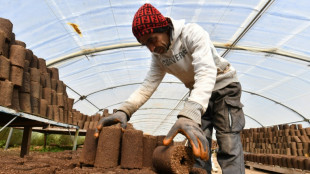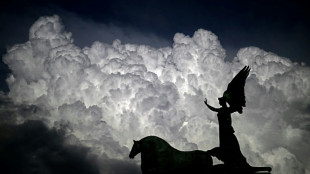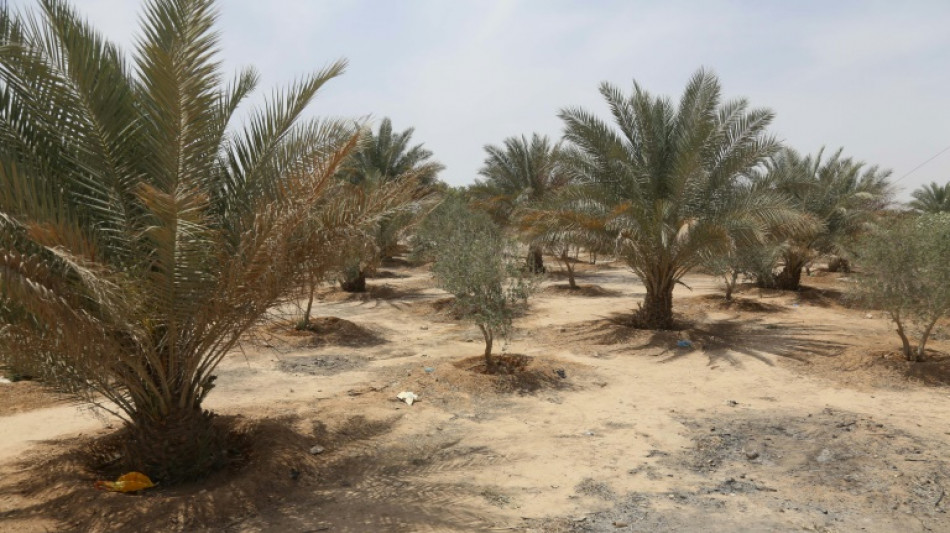
-
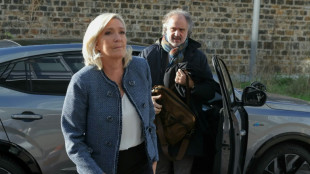 French court hands Le Pen five-year election ban
French court hands Le Pen five-year election ban
-
Probe accuses ex J-pop star Nakai of sexual assault
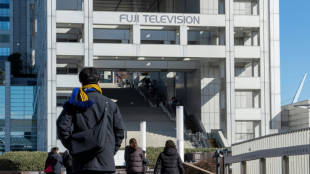
-
 Japan leads hefty global stock market losses on tariff woes
Japan leads hefty global stock market losses on tariff woes
-
Saka 'ready to go' after long injury lay-off: Arteta

-
 Ingebrigtsen Sr, on trial for abusing Olympic champion, says he was 'overly protective'
Ingebrigtsen Sr, on trial for abusing Olympic champion, says he was 'overly protective'
-
Tourists and locals enjoy 'ephemeral' Tokyo cherry blossoms

-
 Khamenei warns of 'strong' response if Iran attacked
Khamenei warns of 'strong' response if Iran attacked
-
France fines Apple 150 million euros over privacy feature

-
 UK PM urges nations to smash migrant smuggling gangs 'once and for all'
UK PM urges nations to smash migrant smuggling gangs 'once and for all'
-
Thai authorities probe collapse at quake-hit construction site

-
 France's Le Pen convicted in fake jobs trial
France's Le Pen convicted in fake jobs trial
-
Chinese tech giant Huawei says profits fell 28% last year

-
 Trump says confident of TikTok deal before deadline
Trump says confident of TikTok deal before deadline
-
Myanmar declares week of mourning as hopes fade for quake survivors

-
 Japan's Nikkei leads hefty market losses, gold hits record
Japan's Nikkei leads hefty market losses, gold hits record
-
Tears in Taiwan for relatives hit by Myanmar quake

-
 Venezuela says US revoked transnational oil, gas company licenses
Venezuela says US revoked transnational oil, gas company licenses
-
'Devastated': Relatives await news from Bangkok building collapse

-
 Arsenal, Tottenham to play pre-season North London derby in Hong Kong
Arsenal, Tottenham to play pre-season North London derby in Hong Kong
-
Japan's Nikkei leads hefty equity market losses; gold hits record

-
 Israel's Netanyahu picks new security chief, defying legal challenge
Israel's Netanyahu picks new security chief, defying legal challenge
-
Trump says US tariffs to hit 'all countries'

-
 Prayers and tears for Eid in quake-hit Mandalay
Prayers and tears for Eid in quake-hit Mandalay
-
After flops, movie industry targets fresh start at CinemaCon

-
 Tsunoda targets podium finish in Japan after 'unreal' Red Bull move
Tsunoda targets podium finish in Japan after 'unreal' Red Bull move
-
French chefs await new Michelin guide

-
 UK imposes travel permit on Europeans from Wednesday
UK imposes travel permit on Europeans from Wednesday
-
At his academy, Romanian legend Hagi shapes future champions

-
 Referee's lunch break saved Miami winner Mensik from early exit
Referee's lunch break saved Miami winner Mensik from early exit
-
Djokovic refuses to discuss eye ailment after shock Miami loss

-
 Mitchell magic as Cavs bag 60th win, Pistons and T'Wolves brawl
Mitchell magic as Cavs bag 60th win, Pistons and T'Wolves brawl
-
Mensik shocks Djokovic to win Miami Open

-
 Duterte lawyer: 'compelling' grounds to throw case out
Duterte lawyer: 'compelling' grounds to throw case out
-
What happens on Trump's 'Liberation Day' and beyond?

-
 Clock ticks on Trump's reciprocal tariffs as countries seek reprieve
Clock ticks on Trump's reciprocal tariffs as countries seek reprieve
-
Japan-Australia flagship hydrogen project stumbles

-
 Musk deploys wealth in bid to swing Wisconsin court vote
Musk deploys wealth in bid to swing Wisconsin court vote
-
Mensik upsets Djokovic to win Miami Open

-
 China manufacturing activity grows at highest rate in a year
China manufacturing activity grows at highest rate in a year
-
'Waited for death': Ex-detainees recount horrors of Sudan's RSF prisons

-
 Japan's Nikkei leads big losses in Asian markets as gold hits record
Japan's Nikkei leads big losses in Asian markets as gold hits record
-
Rescue hopes fading three days after deadly Myanmar quake

-
 'Basketbrawl' as seven ejected in Pistons-Wolves clash
'Basketbrawl' as seven ejected in Pistons-Wolves clash
-
Four men loom large in Microsoft history

-
 Computer pioneer Microsoft turns 50 in the age of AI
Computer pioneer Microsoft turns 50 in the age of AI
-
Trump calls out both Putin and Zelensky over ceasefire talks

-
 Kim Hyo-joo tops Vu in playoff to win LPGA Ford Championship
Kim Hyo-joo tops Vu in playoff to win LPGA Ford Championship
-
Economy and especially Trump: Canadians' thoughts on campaigns

-
 Liberal PM Carney takes lead four weeks before Canada vote
Liberal PM Carney takes lead four weeks before Canada vote
-
SpaceX to launch private astronauts on first crewed polar orbit


Iraq 'green belt' neglected in faltering climate fight
Envisioned as a lush fortress against worsening desertification and sand storms, the "green belt" of Iraq's Karbala stands as a wilted failure.
Sixteen years after its inception, only a fraction of the 76-kilometre (47-mile) crescent-shaped strip of greenery has materialised, though the years proved a deep need for protection against mounting environmental challenges.
Eucalyptus, olive groves and date palms first took root in 2006 as part of a plan for tens of thousands of the trees to form a green protective shield around the city in central Iraq.
"We were very happy because the green belt would be an effective bulwark against dust," said Hatif Sabhan al-Khazali, a native of Karbala -- one of Iraq's Shiite holy cities that attracts millions of pilgrims every year.
Iraq's host of environmental problems, including drought and desertification, threaten access to water and livelihoods across the country.
But nowadays, the southern axis of Karbala's green belt is only about 26 kilometres long while the northern axis of the 100-metre (328 feet) wide strip is even shorter, at 22 kilometres.
Irrigation is sparse. No one pulls out the weeds anymore. Branches of the stunted olive trees sway between date palms -- symbolic of Iraq -- that struggle to grow.
"The construction was stopped," said Nasser al-Khazali, a former member of the Karbala provincial council.
He blamed "lack of interest from the central government and local authorities," saying: "The funding didn't follow."
According to him, only nine billion dinars ($6 million) was spent on the northern axis, out of the originally planned 16 billion dinars.
- It does little -
"Negligence" is how Hatif Sabhan al-Khazali explains the fate of the green belt project.
It's a frequent refrain -- along with "financial mismanagement" -- on the lips of many Iraqis and was a driving factor behind near-nationwide protests against graft, crumbling public services and unemployment that shook the country in 2019.
Iraq has consistently been a low scorer on Transparency International's Corruption Perceptions Index, ranking 157th out of 180 countries for perceived corruption levels in state institutions last year.
What was meant to be a buffer against frequent dust storms that envelop the country does little to lessen their impact.
Earlier in April, two such storms blanketed Iraq in less than one week, grounding flights and leaving dozens hospitalised due to respiratory problems.
According to the director of Iraq's meteorological office, Amer al-Jabri, sand and dust storms are expected to become even more frequent.
He attributed this increase to "drought, desertification and declining rainfall", as well as the absence of green spaces.
Iraq is particularly vulnerable to climate change, having already witnessed record low rainfall and high temperatures in recent years.
In November, the World Bank warned that Iraq could suffer a 20 percent drop in water resources by 2050 due to climate change.
Water shortages have been exacerbated by the building of upstream dams in neighbouring Turkey and Iran.
- 'Criminal gangs' -
These water shortages and the attendant soil degradation have led to a drastic decline in arable land.
Iraq "loses around 100,000 dunams (about 250 square kilometres or 97 square miles) of agricultural land every year", said Nadhir al-Ansari, a specialist in water resources at Sweden's Lulea University of Technology.
"This land is then transformed into desert areas," he said, warning that Iraq should "expect more dust storms" -- which would have dire consequences on agriculture and public health.
Ansari blamed this on the Iraqi government and the "absence of water planning".
During the country's last dust storm, the agriculture ministry assured that it was working on "restoring vegetation cover" in Iraq.
Last year an official with the Ministry of Water Resources referred to "several initiatives" to plant green belts but he said that "unfortunately these belts were not maintained," the state INA news agency reported.
As an example the official cited Karbala, where Hatif Sabhan al-Khazali despairs at seeing the city's green belt left to "criminal gangs and stray dogs".
O.Johnson--AMWN
